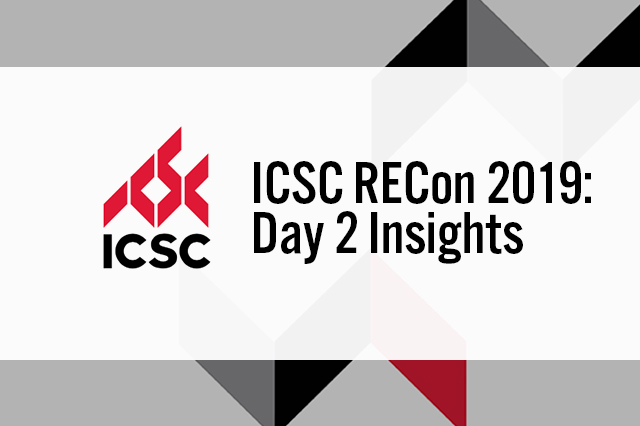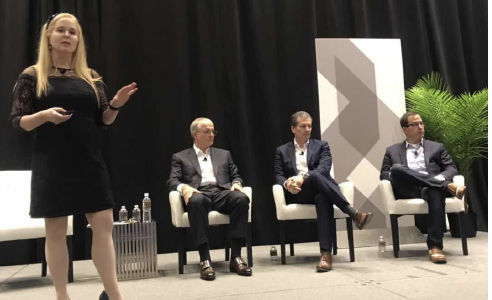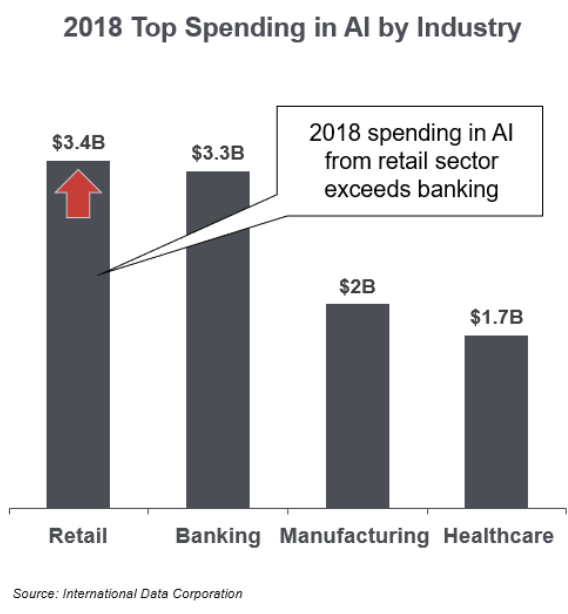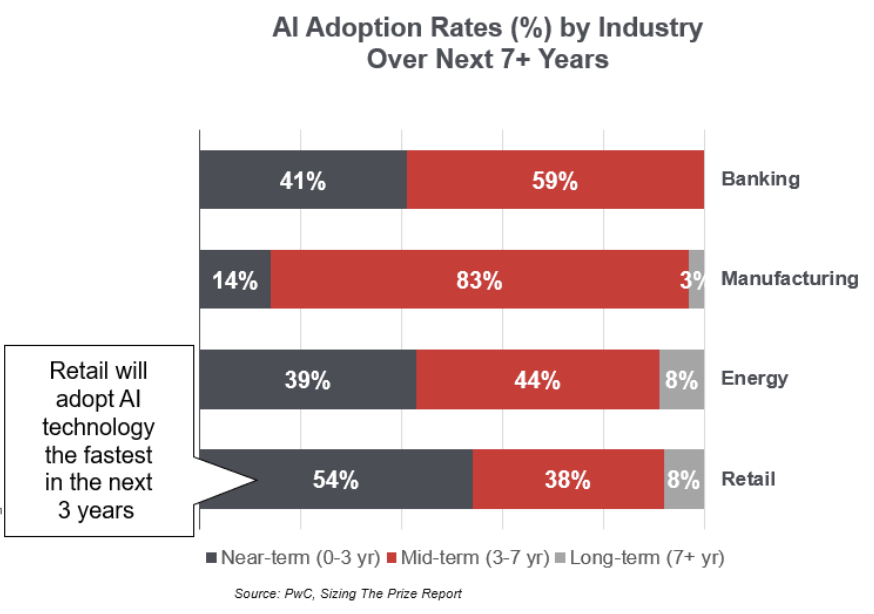
albert Chan
The Coresight Research team is in Las Vegas this week, attending and participating in the International Council of Shopping Centers (ICSC) 2019 RECon event, running May 19-22. RECon is the world’s largest global gathering of retail real estate professionals, with leading developers, owners, brokers and retailers all coming together under one roof.
In this report, we discuss some of the highlights from day 2.
Coresight Research CEO and Founder Deborah Weinswig moderated a panel discussion looking at how retailers are using AI to win. She was joined by Carlos Alberini, CEO and Director of Guess, Inc.; Todd Kahn, President, Chief Administrative Officer and Chief Legal Officer at Tapestry, Inc; and, David Gottlieb, Managing Director, Americas, Trax..
Retailer spending on AI is projected to grow from $2 billion in 2017 to $7.3 billion by 2022. What is so appealing about AI that it is attracting so much retail investment? AI is akin to giving the computer a human-like brain, so AI-powered devices can learn, make decisions and solve problems.
[caption id="attachment_88758" align="aligncenter" width="492"] Coresight Research CEO and Founder Deborah Weinswig kicks off a panel discussion on AI applications in retail with (from left to right) Carlos Alberini, CEO and Director of Guess, Inc.; Todd Kahn, President, Chief Administrative Officer and Chief Legal Officer at Tapestry, Inc.; and, David Gottlieb, Managing Director, Americas, Trax..
Coresight Research CEO and Founder Deborah Weinswig kicks off a panel discussion on AI applications in retail with (from left to right) Carlos Alberini, CEO and Director of Guess, Inc.; Todd Kahn, President, Chief Administrative Officer and Chief Legal Officer at Tapestry, Inc.; and, David Gottlieb, Managing Director, Americas, Trax..
Source: Coresight Research[/caption] In technical terms, some of the functions AI can carry out include:
 We’re seeing AI applied to practical use by some of China’s leading “New Retail” companies.
Alibaba, for example, is changing from manual route planning to smart route planning, which relies on mobility data supplemented by AI, saving time and cutting cost in the crucial last-mile of delivery.
The results have been amazing. Some 70% of parcel deliveries in China are processed by Alibaba’s logistics network Cainiao, supporting 42 million deliveries a day. Alibaba says it has achieved a 30% reduction in travel distances thanks to AI technology.
And, AI ensures Alibaba is able to make the most of China’s massive one-day shopping event on November 11, Singles Day. During Singles’ Day, Alibaba’s auto procurement and allocation system uses data to forecast regional demand and optimizes availability of various products. By directing inventory to warehouses throughout China, many customers received orders the next day despite the huge volume of deliveries.
These are some of the things you need to know about AI in 2019:
We’re seeing AI applied to practical use by some of China’s leading “New Retail” companies.
Alibaba, for example, is changing from manual route planning to smart route planning, which relies on mobility data supplemented by AI, saving time and cutting cost in the crucial last-mile of delivery.
The results have been amazing. Some 70% of parcel deliveries in China are processed by Alibaba’s logistics network Cainiao, supporting 42 million deliveries a day. Alibaba says it has achieved a 30% reduction in travel distances thanks to AI technology.
And, AI ensures Alibaba is able to make the most of China’s massive one-day shopping event on November 11, Singles Day. During Singles’ Day, Alibaba’s auto procurement and allocation system uses data to forecast regional demand and optimizes availability of various products. By directing inventory to warehouses throughout China, many customers received orders the next day despite the huge volume of deliveries.
These are some of the things you need to know about AI in 2019:
 Coresight Research CEO and Founder Deborah Weinswig kicks off a panel discussion on AI applications in retail with (from left to right) Carlos Alberini, CEO and Director of Guess, Inc.; Todd Kahn, President, Chief Administrative Officer and Chief Legal Officer at Tapestry, Inc.; and, David Gottlieb, Managing Director, Americas, Trax..
Coresight Research CEO and Founder Deborah Weinswig kicks off a panel discussion on AI applications in retail with (from left to right) Carlos Alberini, CEO and Director of Guess, Inc.; Todd Kahn, President, Chief Administrative Officer and Chief Legal Officer at Tapestry, Inc.; and, David Gottlieb, Managing Director, Americas, Trax..Source: Coresight Research[/caption] In technical terms, some of the functions AI can carry out include:
- Rule-based reasoning
- Machine learning
- Deep learning
- Natural language processing
- Machine vision
- Autonomous vehicles
- Search recommendation
- Virtual reality
- Translation
- Mapping and geolocation
- Retail investment in AI is now greater than that of the banking sector.
- Retail is set to adopt AI faster than other industries in the next three years.

 We’re seeing AI applied to practical use by some of China’s leading “New Retail” companies.
Alibaba, for example, is changing from manual route planning to smart route planning, which relies on mobility data supplemented by AI, saving time and cutting cost in the crucial last-mile of delivery.
The results have been amazing. Some 70% of parcel deliveries in China are processed by Alibaba’s logistics network Cainiao, supporting 42 million deliveries a day. Alibaba says it has achieved a 30% reduction in travel distances thanks to AI technology.
And, AI ensures Alibaba is able to make the most of China’s massive one-day shopping event on November 11, Singles Day. During Singles’ Day, Alibaba’s auto procurement and allocation system uses data to forecast regional demand and optimizes availability of various products. By directing inventory to warehouses throughout China, many customers received orders the next day despite the huge volume of deliveries.
These are some of the things you need to know about AI in 2019:
We’re seeing AI applied to practical use by some of China’s leading “New Retail” companies.
Alibaba, for example, is changing from manual route planning to smart route planning, which relies on mobility data supplemented by AI, saving time and cutting cost in the crucial last-mile of delivery.
The results have been amazing. Some 70% of parcel deliveries in China are processed by Alibaba’s logistics network Cainiao, supporting 42 million deliveries a day. Alibaba says it has achieved a 30% reduction in travel distances thanks to AI technology.
And, AI ensures Alibaba is able to make the most of China’s massive one-day shopping event on November 11, Singles Day. During Singles’ Day, Alibaba’s auto procurement and allocation system uses data to forecast regional demand and optimizes availability of various products. By directing inventory to warehouses throughout China, many customers received orders the next day despite the huge volume of deliveries.
These are some of the things you need to know about AI in 2019:
- AI will become retailers’ go-to technology to strip friction from brick-and-mortar retail.
- Consumers will come to expect more smart retail experiences, enabled by AI.
- Western retailers will increasingly adopt China’s New Retail as consumers in the US and Europe catch up to China’s heavy preference for digital, and especially mobile, shopping.